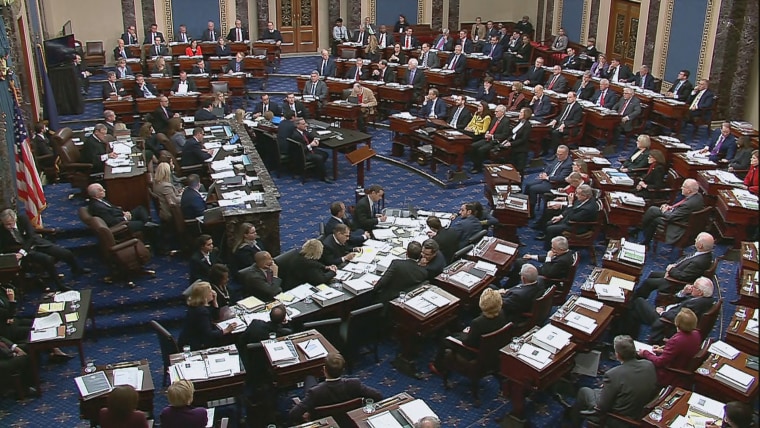It's been nine days since a bipartisan House majority impeached Donald Trump, but it was an open question as to when the Senate impeachment trial would begin. Yesterday, Senate Minority Leader Mitch McConnell (R-Ky.) proposed proceedings that would begin in mid-February.
Evidently, the Democratic majority has a different timeline in mind. NBC News reported this morning:
House Speaker Nancy Pelosi will transmit to the Senate on Monday an article of impeachment against former President Donald Trump, Majority Leader Chuck Schumer announced Friday.... The transmission will trigger preparations for a trial that could start as early as next week, but Senate leaders indicated it may be delayed to allow Trump to organize his defense.
"Make no mistake: A trial will be held in the United States Senate, and there will be a vote whether to convict the president," Schumer told reporters this morning. "Senators will have to decide if they believe Donald John Trump incited the insurrection against the United States."
The procedural logistics remain very much in the air. The assumption was that a Senate trial would begin the day after the House transmitted the impeachment article, but it now appears Senate leaders are open to a delay.
In the meantime, Donald Trump, who struggled to find legal representation for the trial -- as recently as Monday, he had no legal defense team -- has now hired South Carolina-based lawyer Butch Bowers. Evidently, Sen. Lindsey Graham (R-S.C.), who remains in communication with Trump, "arranged" for the former president's new attorney.
The next question, of course, is whether there will be 67 votes to convict Trump at the end of the trial, which in turn could pave the way for Congress to prohibit the Republican from ever again seeking elected office.
The New York Times reported two weeks ago, "While it seemed unlikely that 17 Senate Republicans would join Democrats for the two-thirds necessary for conviction, the anger at Mr. Trump was so palpable that [GOP] leaders said privately it was not out of the question." A separate New York Times reporter added soon after that as many as 20 Senate Republicans are "open" to convicting Trump.
That anger appears to have subsided. Politico reported yesterday that GOP senators are "coalescing around a long-shot bid to dismiss the impeachment trial of former President Donald Trump before it even begins, relying on a disputed legal argument that says putting an ex-president on trial is unconstitutional."
There's reason to believe the argument is wrong -- there's precedent for Senate impeachment trials of former officials after they've left office -- but if Republicans are "coalescing" around the idea, it suggests it might be difficult to find 17 of them willing to vote to convict.
The Hill added this morning, "Only five or six Republican senators at the most seem likely to vote for impeachment, far fewer than the number needed, GOP sources say."
To be sure, that would be a historic rebuke -- in the three previous presidential impeachment trials, Mitt Romney is the only senator to ever vote to convict a president of his own party -- but it would be far short of the total needed.
Watch this space.
